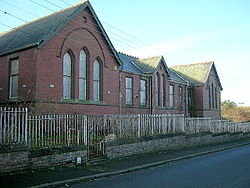Douglas Water

The Douglas Water is a river in Lanarkshire which becomes a tributary of the River Clyde. The river's name is shared with the village of Douglas, Lanarkshire by its banks, and with the House of Douglas, once powerful in these lands. The name appears to be the Gaelic Dubh-ghlas: 'Black Water'.
Course
The river rises in the hills which separate Lanarkshire from Ayrshire, to the south west of Muirkirk. The source is close to that of the River Ayr, which flows west to the sea, but the Douglas Water runs north-east then east, past Glespin and into Douglasdale. Here the river flows through the village of Douglas, and past the scant remains of Douglas Castle. The castle was a stronghold of the House of Douglas, a powerful mediæval family, whose Norman ancestors settled here in the 12th century and took their surname from the river. The A70 road follows the river through Douglasdale, and on to the Clyde.
East of Douglas, the river passes under the M74 motorway, just south of the Happendon services, and turns toward the north-east again. Below the village of Rigside, the smaller Poniel Burn flows into the Douglas Water. Beyond this confluence is the small village of Douglas Water.
A dismantled railway line runs between the river and the A70 for the remaining 2 miles of its course. The Douglas Water flows into the Clyde around 3 miles south of Lanark.
Douglas Water village
| Douglas Water | |
| Lanarkshire | |
|---|---|
 Disused school in Douglas Water | |
| Location | |
| Grid reference: | NS873363 |
| Location: | 55°36’28"N, 3°47’24"W |
| Data | |
| Postcode: | ML11 |
| Local Government | |
| Council: | South Lanarkshire |
Douglas Water is a also the name of a small village in Lanarkshire, named after the river, which flows through the village. Mining operations provided employment to local people, and the village was bolstered by the Coltness Iron and Coal Company establishing an operation nearby. Three haulage companies that operated from the village also provided a source of employment.
History
This was a mining town, now declined since the pit wheel stopped turning in 1967. Douglas Water railway station serviced the village, but it stopped being a working station around the time of the Beeching cuts. The station platform still exists.
When the last coal mine in the village closed in 1967 the village lost much of its population, as people left for other areas in search of employment. This was the beginning of the decline for Douglas Water as after then the local amenities, football club, railway station and much of the other services in the village closed. The village today is a shadow of its former self, with many streets lying totally empty where the houses that once stood there having long since been demolished.
Douglas Water was the site for the performance of a play called "The Disinherited" by local people in the 1930s that had been written by the socialist writer and activist, Edward Hunter.
Sport
There was for many years a junior football team that played in the village, known as Douglas Water Thistle, but they became defunct some time ago. Several of their players would go on to enjoy careers as professional footballers.
Outside links
| ("Wikimedia Commons" has material about Douglas Water (village)) |
| ("Wikimedia Commons" has material about Douglas Water (river)) |